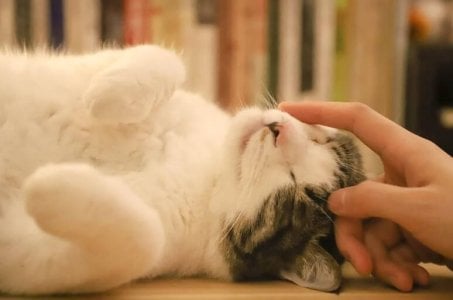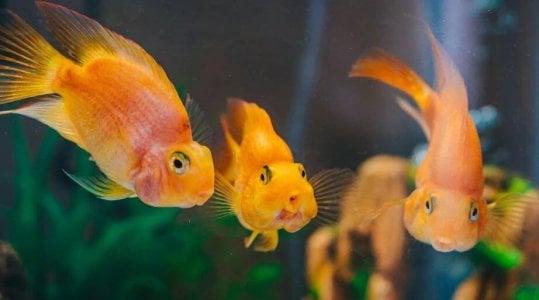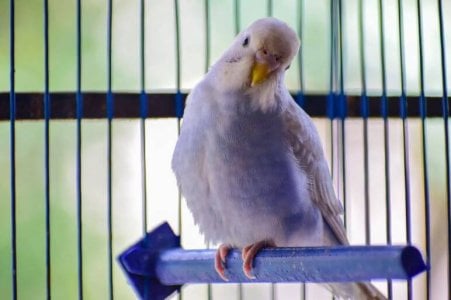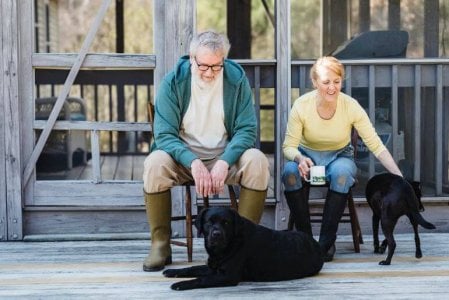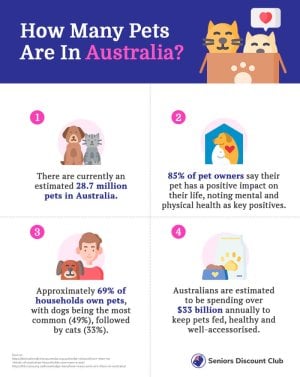Pets bring joy to aged care residents through the paw-er of companionship
- Replies 14
For many, aged care can be a difficult journey. Not only can it be a challenge to adjust to a new lifestyle but it can also be hard to give up some of the things you once enjoyed such as independence.
Aged care residents often also relinquish their beloved pets before entering the facility, making it more difficult to adjust to their new surroundings.
Whether they’re covered in fur, feathers, or fins, our pets are an important part of our family. While these lovable companions keep us company at home, aged care residents are usually made to give up their pets as a condition of entry into the facility.
It is understood that because aged care facilities are shared spaces, some residents may feel left out if they don’t have a pet to take with them, or other residents may be allergic to the fur of a four-legged friend.
But now, researchers at the University of South Australia are calling for the Federal Government to mandate financial support for special companions in aged care facilities.
According to the researchers, this is to help improve the mental health and well-being of thousands of elderly Australians.
This comes after researchers explored the practical models of hosting companion animals in aged care, including foster animals and personal pets.
Dr Janette Young, UniSA researcher and project lead, explained how the benefits of human-animal relations must not be underestimated, particularly for older people in aged care.
Dr Young added: ‘There’s no doubt that Australians love their pets. In fact, we have one of the highest rates of pet ownership in the world.’
According to the RSPCA, there are currently an estimated 28.7 million pets in Australia. Approximately 69 per cent of households own pets, with dogs being the most common (49 per cent), followed by cats (33 per cent).
Dr Young claimed that the great thing about having pets is that they can help us feel happier and healthier.
‘They can do this in different ways: we take them on walks and play with them so they help us stay active; we feed and care for them, so they give us purpose; but most importantly, they’re always there to give us conditional love and companionship,’ the doctor stated.
However, as we get older, pet ownership also declines and along with it, the benefits.
Although previous reports have stated that pet ownership has been on the decline since late 2015/early 2016, the numbers increased after it was reported that more people have been giving up their pets as an after-effect of the COVID-19 pandemic.
This led to many animal shelters feeling ‘overwhelmed’ by the number of pets given up for adoption. You can read more details here.
According to Dr Young, one of the most unrecognised issues of ageing is touch deprivation. ‘Pets are there to pat and cuddle and can make all the difference to someone when they’re feeling sad or down,’ Dr Young added.
For older people in residential care, a more supportive and healthier environment is needed to help them adjust.
‘This is a moral imperative. Yet too often we’ve seen the system break under pressure.’
Dr Young’s team has been working on ways to maintain human and animal connections as we age. One of the projects they’ve been investigating is cats living in residential care.
‘The intention is that two adult cats would live among the residents in a dedicated wing of an aged care facility and be cared for by a select group of trained staff and volunteers.’
Based on the researcher’s hypothesis, the cats living in the facility would help ease residents’ loneliness, as well as relieve stress, anxiety, and depression.
‘They’d be there to pat, to talk to, to care for and love, and to provide that special sense of companionship.’
This argument was supported by The Royal Commission into Aged Care Quality and Safety after it found that the aged care industry was characterised by a lack of innovation and was not built around the people it was supposed to help.
There are pet-friendly aged care facilities available, but they only constitute 18 per cent of aged care facilities in Australia.
Thus, UniSA’s ‘Cats in Aged Care’ project could support the emotional needs of people in the remaining facilities.
‘We’re right on the precipice of making significant changes to aged care that could positively change the everyday lives of residents,’ Dr Young shared before adding that her team has established a tool that assesses any risks to humans and animals.
She assured everyone that the team is ‘ahead of the game’ in terms of safety. The challenge now is to make the project happen.
According to the researchers, their biggest obstacle has been the pandemic. Once COVID-19 hit, access to aged care facilities became extremely limited.
‘While the effects of the pandemic have been felt around the globe, the negative impact has been disproportionately great for those in residential aged care.’
Researchers face the issue of funding as well, as many aged care facilities are excited to try new innovations but lack financial support. Staff turnover is also a significant barrier.
‘We need the Federal Government to stand up to fund pets in aged care… It’s no longer good enough for people to simply live longer. They need to be assured of happy, healthy, and meaningful older years, and for pet-loving older people, this means including their beloved pets.’

Do you have pets, members? What do you think about this research from UniSA? Share your thoughts with us in the comments!
Aged care residents often also relinquish their beloved pets before entering the facility, making it more difficult to adjust to their new surroundings.
Whether they’re covered in fur, feathers, or fins, our pets are an important part of our family. While these lovable companions keep us company at home, aged care residents are usually made to give up their pets as a condition of entry into the facility.
It is understood that because aged care facilities are shared spaces, some residents may feel left out if they don’t have a pet to take with them, or other residents may be allergic to the fur of a four-legged friend.
But now, researchers at the University of South Australia are calling for the Federal Government to mandate financial support for special companions in aged care facilities.
According to the researchers, this is to help improve the mental health and well-being of thousands of elderly Australians.
This comes after researchers explored the practical models of hosting companion animals in aged care, including foster animals and personal pets.
Dr Janette Young, UniSA researcher and project lead, explained how the benefits of human-animal relations must not be underestimated, particularly for older people in aged care.
Dr Young added: ‘There’s no doubt that Australians love their pets. In fact, we have one of the highest rates of pet ownership in the world.’
According to the RSPCA, there are currently an estimated 28.7 million pets in Australia. Approximately 69 per cent of households own pets, with dogs being the most common (49 per cent), followed by cats (33 per cent).
Dr Young claimed that the great thing about having pets is that they can help us feel happier and healthier.
‘They can do this in different ways: we take them on walks and play with them so they help us stay active; we feed and care for them, so they give us purpose; but most importantly, they’re always there to give us conditional love and companionship,’ the doctor stated.
However, as we get older, pet ownership also declines and along with it, the benefits.
Although previous reports have stated that pet ownership has been on the decline since late 2015/early 2016, the numbers increased after it was reported that more people have been giving up their pets as an after-effect of the COVID-19 pandemic.
This led to many animal shelters feeling ‘overwhelmed’ by the number of pets given up for adoption. You can read more details here.
According to Dr Young, one of the most unrecognised issues of ageing is touch deprivation. ‘Pets are there to pat and cuddle and can make all the difference to someone when they’re feeling sad or down,’ Dr Young added.
For older people in residential care, a more supportive and healthier environment is needed to help them adjust.
‘This is a moral imperative. Yet too often we’ve seen the system break under pressure.’
Dr Young’s team has been working on ways to maintain human and animal connections as we age. One of the projects they’ve been investigating is cats living in residential care.
‘The intention is that two adult cats would live among the residents in a dedicated wing of an aged care facility and be cared for by a select group of trained staff and volunteers.’
Based on the researcher’s hypothesis, the cats living in the facility would help ease residents’ loneliness, as well as relieve stress, anxiety, and depression.
‘They’d be there to pat, to talk to, to care for and love, and to provide that special sense of companionship.’
This argument was supported by The Royal Commission into Aged Care Quality and Safety after it found that the aged care industry was characterised by a lack of innovation and was not built around the people it was supposed to help.
There are pet-friendly aged care facilities available, but they only constitute 18 per cent of aged care facilities in Australia.
Thus, UniSA’s ‘Cats in Aged Care’ project could support the emotional needs of people in the remaining facilities.
‘We’re right on the precipice of making significant changes to aged care that could positively change the everyday lives of residents,’ Dr Young shared before adding that her team has established a tool that assesses any risks to humans and animals.
She assured everyone that the team is ‘ahead of the game’ in terms of safety. The challenge now is to make the project happen.
According to the researchers, their biggest obstacle has been the pandemic. Once COVID-19 hit, access to aged care facilities became extremely limited.
‘While the effects of the pandemic have been felt around the globe, the negative impact has been disproportionately great for those in residential aged care.’
Researchers face the issue of funding as well, as many aged care facilities are excited to try new innovations but lack financial support. Staff turnover is also a significant barrier.
‘We need the Federal Government to stand up to fund pets in aged care… It’s no longer good enough for people to simply live longer. They need to be assured of happy, healthy, and meaningful older years, and for pet-loving older people, this means including their beloved pets.’
Key Takeaways
- Researchers at the University of South Australia are calling for the Federal Government to mandate financial support for pets in aged care to help improve the mental health and well-being of thousands of residents.
- Pets can provide people in aged care facilities with joy and companionship.
- Many aged care facilities still do not allow pets.
Last edited:


